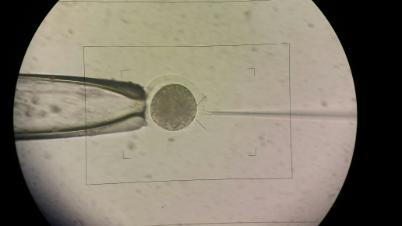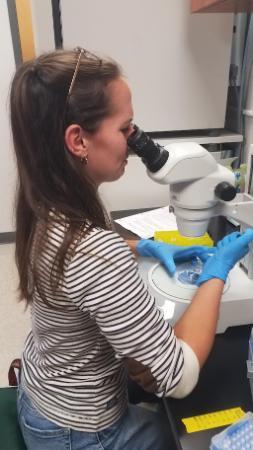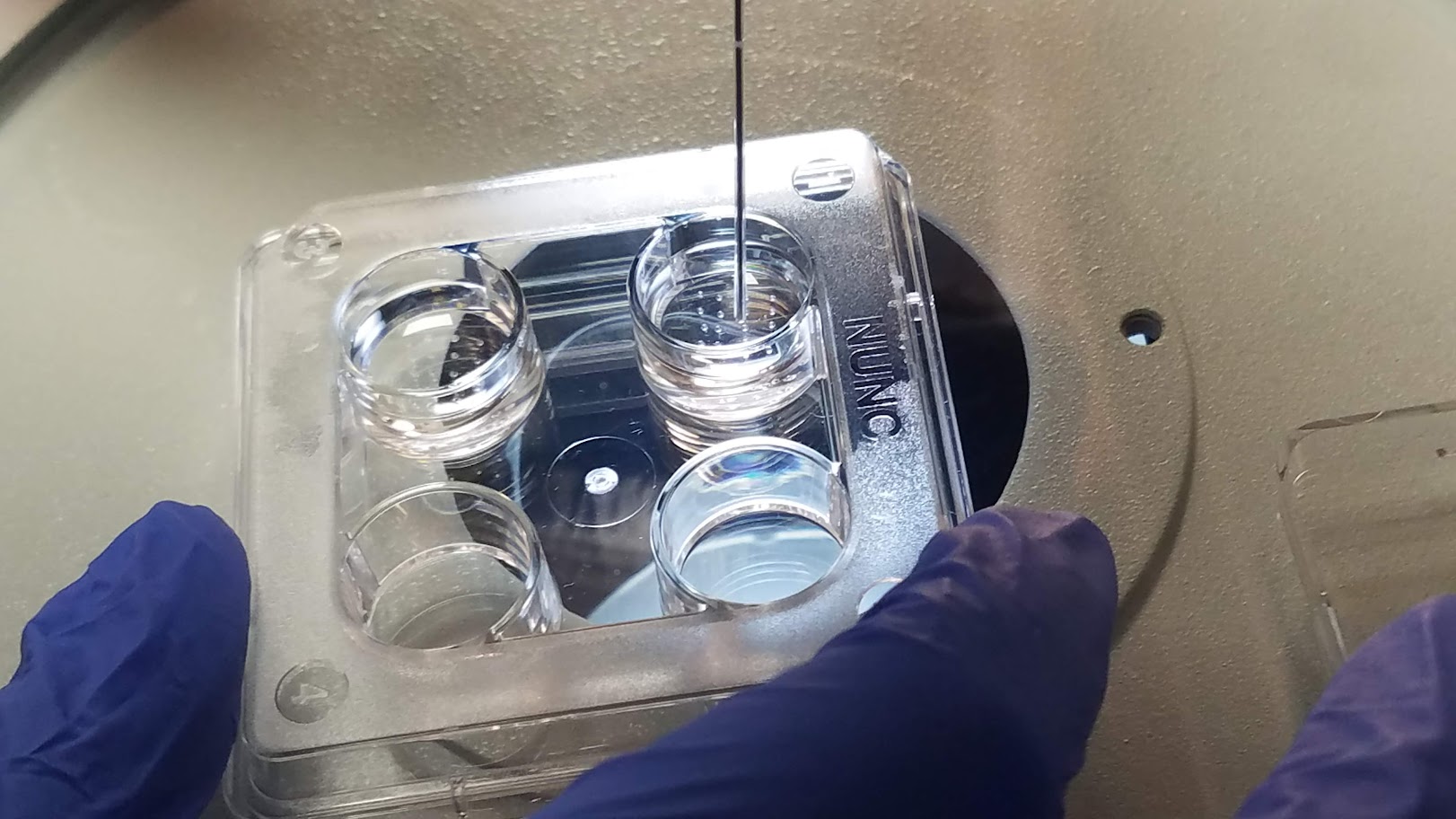Daigneault Laboratory
Focus - Environmental Influence on Post-ejaculatory Sperm Function Through Embryo Development
The laboratory specializes in utilizing large animal models to address emerging and existing reasons for infertility in animals and humans. We primarily use bovine gametes and embryos to address idiopathic subfertility that also serve as models for human embryo development. Existing projects in the laboratory equally span male and female reproductive biology with a concentric focus on basic functions that drive early embryo development for applied and translational agriculture and biomedical sciences. Assisted reproductive technologies are a large component of research (IVF, ET, AI, vitrification) spanning multiple species (bovine, equine, ovine, porcine). Complementary techniques include the use of CRISPR/Cas technologies (zygotic injection, electroporation) for gene editing to identify genomic requirements of early embryo development and pregnancy recognition including paternal contributions to blastocyst formation. In complement, the laboratory models gamete and embryo environmental interactions with a focus on contaminants and toxicants that alter sperm function and embryo development both structurally and at the genome/epigenomic levels. We also optimize and design semen extenders for multiple purposes in different species for commercial and research applications.
Existing Projects
- Functional characterization of genes required for early blastocyst formation and trophoblast function in cattle
- Roles of nuclear and mitochondrial proteins in sperm function and fertilization
- Impact of environmental exposure to extra-gonadal sperm on fertilization potential and embryo development
- Optimization of techniques and conditions to improve storage time in cooled stallion semen
- Development of customized bull semen extenders for specific applications (sex-sorting, long-term storage)
- Characterization of Florida Native Sheep seminal parameters
Gene Editing - CRISPR technologies
Infertility and embryonic failure are highly evident in both humans and cattle. The laboratory is building from previously published work to demonstrate conserved function in pluripotent genes as master regulators of embryonic development in cattle and humans. Delivery of CRISPR/Cas9 components into bovine zygotes is achieved to generate gene-edited embryos intended to understand basic biology and the genetic architecture required for successful establishment and maintenance of pregnancy.

Environmental Toxicology
Paternal exposure to environmental toxicants is a highly understudied area of research in large animals and humans. Our works aim to identify and determine consequences of environmental exposure of common contaminants to post-ejaculatory sperm function and subsequent embryo development. Using a bovine model and embryo continuum, sperm are exposed to physiological and environmentally relevant levels of toxicants to understand consequences on sperm function including motility, fertilization, and subsequent embryo development.
Semen Extenders/Diluents
Our laboratory optimizes and designs semen extenders primarily in bovine and equine for specific needs including transportation at ambient temperature, sex-sorting, increased velocity for timed-AI protocols, and prolonged maintenance of frozen-thawed sperm. Extenders are validated for compatibility in the laboratory using Computer-Assisted Sperm Analyses and submitted for Patent approval towards industry and research applications.
Dr. Daigneault is an Assistant Professor in the Department of Animal Sciences at the University of Florida whose laboratory conducts research focusing on reproductive biology and assisted reproductive technologies in multiple livestock species. Some ongoing equine initiatives are focused on industry applications that include lengthening the storage time of cooled stallion semen for artificial insemination, optimization of equine IVF protocols and identifying alternative methods of immunocontraception for feral equids.
Prolonged Storage of Cooled Stallion Semen for Artificial Insemination
Current protocols for shipping stallion sperm for artificial insemination require collecting fresh sperm from stallions and then cooling semen in commercial shipping devices that regulate the rate of cooling and maintenance of temperature at 4-5°C. Cooling stallion semen slows the metabolic processes of sperm, thereby extending the lifespan of sperm as compared to holding semen at or above room temperature. When semen is collected from a stallion and then shipped to a facility for artificial insemination, the motility of sperm is usually only sufficient for fertilization when collections are used with 24 hours. Our laboratory at the University of Florida is working to prolong the lifespan of sperm that are cooled for shipment for several days beyond the industry standard 24-48 hour timeframe. Extending the lifespan of cooled semen while maintaining motility that is acceptable for artificial insemination alleviates several logistical restrictions within the breeding industry including more flexible timing from stallion collection to mare insemination, especially for cases of delayed ovulation or disruption of shipments.
Optimization of Conditions of Equine IVF and ART
An additional initiative of the Daigneault Laboratory is to optimize conditions for the production of equine embryos by in vitro fertilization (IVF). Historically, equine IVF has been highly unsuccessful for reasons that are usually attributed to incompatibilities of stallion sperm outside of the female reproductive tract for fertilization. The Daigneault Laboratory is currently optimizing ideal conditions for sperm outside of the female reproductive tract that allow successful penetration and fertilization of the equine egg for continued embryo development. Recent advances have described the success of equine IVF in 2023, but success and repeatability rates remain quite low or undocumented. The Daigneault Laboratory is working to develop a robust and universal protocol that can be applied for multiple stallions towards increased production of equine IVF embryos.
Equine Contraceptive Development
In collaboration with the US National Wildlife Research Center, Dr. Daigneault’s group has partnered in a project to identify alternative methods for equine immunocontraceptive approaches with an overall goal of reducing and controlling the feral equine population. Current methods involve routine vaccines that are not always logistically feasible and have varying results. The laboratory hopes to identify alternative methods towards improving these initiatives. Some bottlenecks that greatly challenge research progress include lack of a stable herd of UF research mares and stallions. The Daigneault Lab is working to develop the first UF Equine Reproductive Technologies Herd with the help of philanthropic donations. Please feel free to contact us directly to learn more.
https://animal.ifas.ufl.edu/equine/research-programs/
b.daigneault@ufl.edu
Interdisciplinary Involvement
- Reproductive and Perinatal Biology Research Program
- Animal Molecular & Cellular Biology
- UF Equine Sciences
Courses Taught
- Reproductive Physiology and Endocrinology in Domestic Animals – ANS3319C
- Applied Animal Reproduction – ANS4320C & ANS6312C

Contact
BRAD DAIGNEAULT
Assistant Professor of Reproductive Biology
b.daigneault@ufl.edu
Lab Information
Current Laboratory Members
- João Diego de A. Losano, DVM, MS, PhD – Visiting Scholar
- Maura McGraw – PhD Student
- Sohail Muhammad – PhD Student
- Jillian Guertin – MS Student
- Jordan Bishman – Undergraduate Scholars Program
- Halima Sultana – Biological Scientist – Lab Manager
- Justin Callaham, MS, Lecturer – Equine Collaborator




